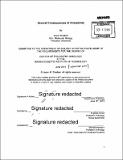Several consequences of aneuploidy
Author(s)
Sheltzer, Jason (Jason Meyer)
DownloadFull printable version (28.65Mb)
Other Contributors
Massachusetts Institute of Technology. Department of Biology.
Advisor
Angelika Amon.
Terms of use
Metadata
Show full item recordAbstract
Whole-chromosome aneuploidy, or a karyotype that is not a multiple of the haploid complement, is the most common cause of miscarriage and developmental delay in humans. Aneuploidy is also a hallmark of cancer: greater than 90% of tumors display chromosomal copy number alterations. Thus, understanding the consequences of aneuploidy has broad relevance for human health and development. To that end, I have studied several distinct aspects of aneuploid cell biology. In the budding yeast Saccharomyces cerevisiae, I demonstrated that single-chromosome gains are sufficient to induce numerous forms of genomic instability. Aneuploid yeast strains displayed increased rates of forward mutation, mitotic recombination, chromosome loss, and double-strand break formation, which could significantly impact the evolution of tumor genomes. Secondly, I characterized the effects of aneuploidy on gene expression. I established that aneuploidy induced a transcriptional stress response that was independent of the identity of the extra chromosome and was remarkably well-conserved among eukaryotes. This gene expression program was apparent in trisomic primary cells as well as in chromosomally-unstable cancer cells. Thirdly, I compared the tumorigenicity of euploid and trisomic cell lines that were genetically-identical and differed only in karyotype. I discovered that under most circumstances, aneuploidy impeded proliferation, anchorage-independent growth, and tumor formation in xenografts. Thus, single-chromosome aneuploidy actually functions as a tumor suppressor, rather than a tumor-promoting agent. In total, these results shed light on the diverse ways that chromosomal imbalances can alter the physiology of normal cells and of cancer.
Description
Thesis: Ph. D., Massachusetts Institute of Technology, Department of Biology, September 2015. Cataloged from PDF version of thesis. "June 2015." Written on title page: "September 2015." Includes bibliographical references.
Date issued
2015Department
Massachusetts Institute of Technology. Department of BiologyPublisher
Massachusetts Institute of Technology
Keywords
Biology.